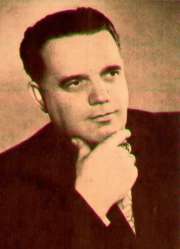|
Biography Franz Bardon
Franz Bardon (December 1, 1909 ‚Äď July 10, 1958), born in Opava, Austrian Silesia, was both a stage magician and student and teacher of Hermetics. He was member of Czech hermetic society Universalia. During World War II Bardon was at one point held in a concentration camp for refusing to participate in Nazi Mysticism. Bardon was rescued by Russian soldiers who raided the camp. Bardon continued his work in the fields of Hermetics until 1958 when he was arrested and imprisoned in Brno Czechoslovakia. Bardon died on July 10, 1958 while in the custody of police.
He is best known for his three volumes on Hermetic magic. These volumes are Initiation Into Hermetics, The Practice of Magical Evocation and The Key to the True Quabbalah.
Additionally there was a fourth work attributed to him by the title of Frabato the Magician, supposed to be a disguised autobiography. Though the book lists its author as Bardon, it was actually written by his secretary, Otti Votavova. While some elements of the story are factual, the majority of the book was written as an occult novel with much embellishment on the part of Votavova.
Bardon's works are most notable for their simplicity, their relatively small theoretical sections, and heavy emphasis on practice with many exercises. Students of his, such as William Mistele and Rawn Clark consider him to have written the best training programs of any magician of the 20th century. They were written with the intention of allowing students who wished to practice magic the means to do so if they could not study under a teacher.
Possible Weaknesses: To properly appreciate Bardon's works, it is necessary to set them along side other significant teachers of Western spiritual Ways in the 20th Century, most notably Rudolf Steiner, the discoverer of Anthroposophy, and Valentin Tomberg, the author of Meditations on the Tarot: a journey into Christian Hermeticism. Steiner discouraged the study of magic, believing the modern soul has before it other tasks in the present, and that a proper study of magic belongs in future incarnations of the human being. Tomberg (see his discussion of Force: Arcanum 11) would find the focus on powers in Bardon to mostly concern itself with what Tomberg called: Bios, or earthly electricity. Bios according to the Meditation (Arcanum) on Force (the symbol is the woman holding open the jaws of a lion) is not the highest principle of Force - rather that highest principle is called there: Zoe.
Zoe is that which comes from the Divine Mother and does not operate so much as "power", but instead as a kind of emollient. Tomberg relates this "Force" to the following from this part of the Emerald Tablet (Tabula Smaragdina): "This thing is the strongest of all powers, the force of all forces, for it overcometh every subtle thing and doth penetrate every solid substance". The woman holds open the jaws of the lion, not because she overpowers the lion, but because the quality of her being is such that she is able to be the lion and the lion being her (holy animality) obeys voluntarily her desires.
In Bardon there is then a possible confusion between the will of the Magician and the will of other beings, unless this idea of Zoe (communion with, instead of dominion over) is properly understood.
|




